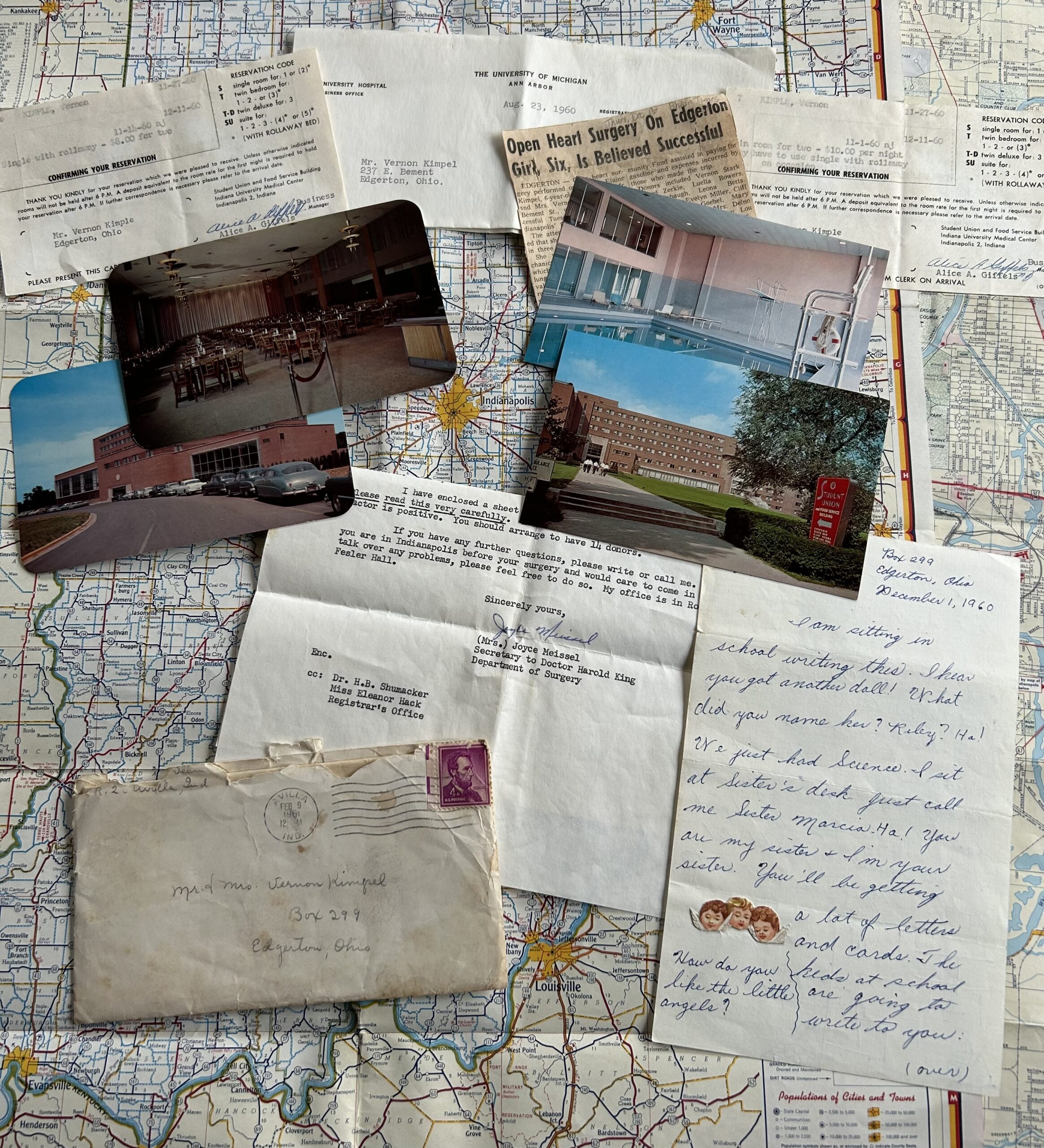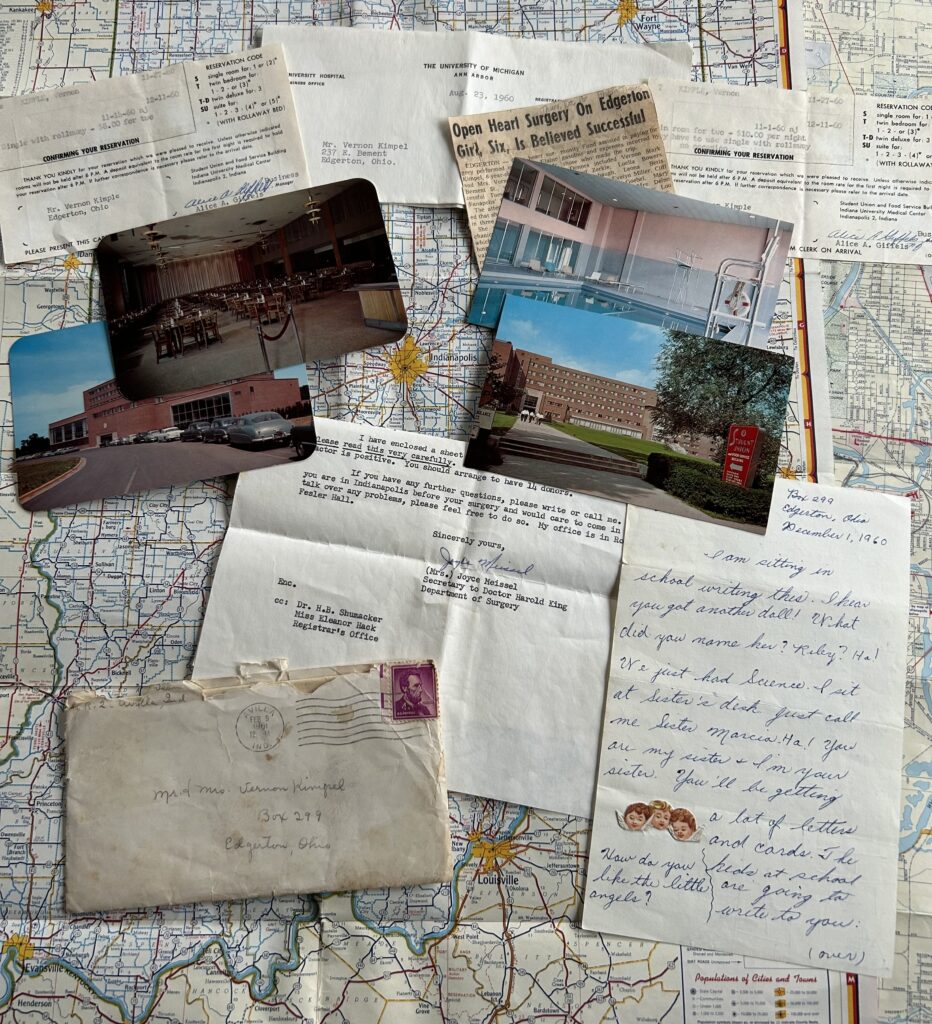
Regifting
My favorite regifting story is one my mother told years ago. But I didn’t recognize it as a regifting story until I read a letter she’d written home to her children. The year was 1960, and my parents, Vernon and Ruth Kimpel, were in Indianapolis for my sister’s scheduled open-heart surgery.
Mom and Dad were the parents of seven children, and their six-year-old daughter, Elaine, was in need of surgery. Dad would need time away from work. And Mom would have to arrange for her own mother and father to care for their six other children while they spent the week in Indianapolis at Riley Hospital for Children.
Mom had saved a letter she’d received from Indiana University Medical Center. They were informed the family needed to locate 14 volunteers willing to travel to Indianapolis the day before the surgery to donate blood. Two volunteers would need to agree to be standby donors on the day of the surgery.
When I imagine being in my mother’s shoes, I can’t help but think of the amount of work she had to keep up with. She was a mother of seven children. The local bloodmobile was able to provide a list of community members whose blood type was O+.
We still own the desk Mom likely sat at while she held her corded, rotary dial phone and spent time contacting people who could help her daughter.
The names of those who donated blood, as well as those of the four drivers, were published in the newspaper. They met in front of Bob’s Dairy Bar on Monday, November 28 at 10 a.m. and left for Indianapolis in a caravan.
Elaine’s surgery took place the next day. She remembers very little of her experience and always felt the story isn’t her story – it’s Edgerton’s story.
I recently stumbled across the word “ephemera” which was new to me. I laughed as I read the definition and thought to myself that Mom collected all things ephemera: items that are meant to be used and then thrown away. She saved ticket stubs and brochures. Maps and receipts. Notes she’d scribbled. And I was able to piece together the story of Edgerton’s campaign to help the family: “Operation Open Heart.”
The people of the community were generous beyond measure. They set up fundraisers. They donated cash. They showed up with food. They gave gifts to Elaine. Their concern was genuine.
Apparently finding your own blood donors was a normal thing to do back in 1960. My parents had no choice but to take on the task. There they were – asking friends to take a day away from their own lives, travel to the city, and give new meaning to the word “give.”
It turned out that more than 20 volunteers stepped forward and traveled to Indianapolis together.
In Mom’s notes, I found names and addresses of parents they’d become acquainted with during their week’s stay at the hospital. In one of her letters home to the family, she wrote that they’d learned there was a woman from Avilla, Indiana, staying in the hospital lobby while her daughter was a patient. The woman was said to be living on coffee and getting very little sleep. My dad found her and gave her a ten-dollar bill which is equivalent to $85 in today’s currency.
So there were my parents: regifting cash that had been given to them.
Mom and Dad are gone now, and ten dollars is one thing I know they left behind to someone who needed help.
My aunt Luella Bowers was one of the blood donors. We occasionally heard her say that the donor card that had been issued to her in 1960 was still in her purse. At her funeral, her sons reminded us that Aunt Luella never stopped carrying that card. She kept her donor card close to her heart from the age of 40 to the age of 92 when she passed away.
What did Aunt Luella leave behind? A lot of love and light. And memories of being a part of the recovery of a six-year-old little girl who happened to be her niece.
Within Mom’s collection of newspaper clippings is a copy of Don Houk’s column “Star Gazing” that was published in The Edgerton Earth newspaper in December of 1960. Don shared a few words from a letter he’d received from the Indiana University Medical Center. The letter was signed by Dr. J.L. Arbogast and reads:
“Congratulations to you, too! The fact that you have qualified under the necessarily rigid tests before you were accepted as a donor indicates that you are blessed with good blood and good health. These are precious gifts.”
Don went on to write: Why am I confused? They must have forgotten that I blacked out after giving my pint. I fought the nurses and orderly with flailing hands and feet. I turned such a ghostly shade of white they wouldn’t let anyone else in the “drawing” room while I was there (I guess they didn’t want everyone else to see such a horrible example of a blood donor!)
This is good health?
I should have the same good health as Art Radabaugh … his blood was so well “aged” according to one of the nurses that they put it in two plastic bags.
“Pretz” Stark still maintains that Elaine came through her operation in better shape than I did the blood donation.
As I wrote this article, I realized that even a good story can be regifted.
Perhaps the greatest charity comes through simply being thoughtful of others’ needs. To be kind. To forget judging or categorizing people. To remain quiet. To send love and light through prayers. To lend our strong arms while we’re still strong. To joke with others. To be the person who can drive in the city. To step forward when we’re one of a few, or one of many, who can give strength to those who are living under the weight of a story never lived before. To give new meaning to the word “give.”

Some of the 1960 memorabilia my mother saved. The letter on the bottom right was written by our oldest sister Marcia. In the letter she asked Elaine if she was going to name her new doll “Riley.”

Leave a Reply
You must be logged in to post a comment.